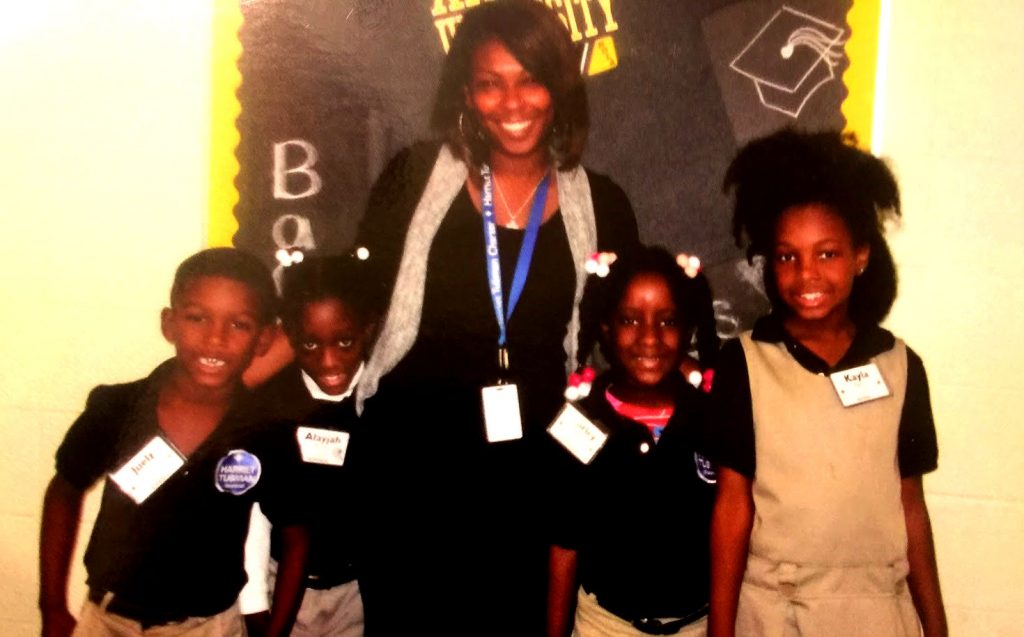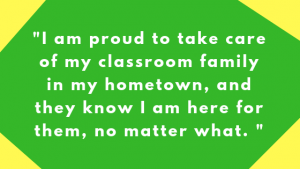My Classroom is a Family

By Chiante Cunningham
Ms. Cunningham is a special education teacher at Harriet Tubman Charter School and a 2018 New Orleans Excellence in Teaching Award Winner.
Ever since I was a girl, growing up on Terry Street in Algiers, I knew I wanted to be a teacher. I gathered my younger neighbors and my cousins and I took care of them, teaching lessons and helping them as they played games like Life and Monopoly. Together, we were a family, and I treated each child as though they were my own brother or sister. I wanted to be a role model and a leader for each one.
Today, my childhood dream has become my life’s work. I am a special education teacher for Kindergarten through 8th grade at Harriet Tubman Charter School in Algiers, not too far from where my first “classroom” was held. And still today, I think of my students as a part of my family. I have two phenomenal daughters of my own—they are 9 and 15 years old. But every day at school, I have eighteen other children that are a part of my life. I am a part of their families, too, and I believe that is critical to being a great teacher.
As a special educator, I get to work with students that the world doesn’t always believe in. Some people put limits on what my students can achieve, but I know—and their families know—that they are capable of so much. That’s why it is so important that we work together to help them reach their dreams.
The needs of my students don’t start or stop at the door of the classroom, and so my families and I need to collaborate.
I know that parents will do anything they can to see their child grow, and so will I. When we work together, making sure a child has a smooth experience from home, to school, and back again, we make that child feel stronger and more secure. I have been working in schools for fourteen years, and I know that starting these new relationships isn’t always easy.
So I have three pieces of advice for new teachers looking to involve their students’ families: be considerate of parents’ time, be supportive, and be available:

Be considerate of parents’ time: Understand that your families have different structures and schedules, and you need to work the best you can to work around that. For instance, the mother of one of my students works long hours and she can’t help her child with homework at night. So the two of them come early to school in the morning and work on homework together with me. We are in this together, so we figured out a schedule that worked for all three of us.

Be supportive: Supporting children with different learning needs can be challenging, so let parents know that you are a team. Make sure to not only call parents when something goes wrong for a child. Call about the successes, too, no matter how small. It makes a world of difference—parents want to celebrate their child. Touch base at least every week and build a rapport. You will also learn valuable information about your students’s worlds outside of school.

Be available: Let parents know that they can reach you, that you’re not pushing their needs under the rug. I still take phone calls from parents of students I taught years ago—they know I’m always here for them and eager to help. As I do these things, I make sure to structure our class community as a family, too, just as it was years ago when I taught my younger cousins and friends.
I make the classroom itself, warm like a home, decorated with bright colors and my students’ art. And, I frame our values and behaviors around the concept of family. My students are learning social skills, and this helps them know how to interact. For instance, two children were in an argument, the other day, and I heard another student pipe up to stop them. He said, “That’s not what we do—we get along in here, because we are a family.”
He was right—just like a family, there might be times in my classroom when we struggle, but at the end of the day, we get past it and stick together. We are here for each other; we share in the tough moments and the great moments alike. We love one another and celebrate our shared success. I am proud to take care of my classroom family in my hometown, and they know I am here for them, no matter what.
